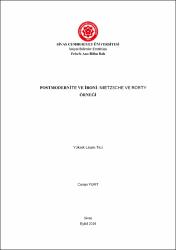| dc.contributor.advisor | Sarıoğlu, Hüseyin | |
| dc.contributor.author | Yurt, Canan | |
| dc.date.accessioned | 2020-01-08T13:44:42Z | |
| dc.date.available | 2020-01-08T13:44:42Z | |
| dc.date.issued | 2019 | tr |
| dc.date.submitted | 2019-09-02 | |
| dc.identifier.other | V, 115 sayfa | |
| dc.identifier.uri | https://hdl.handle.net/20.500.12418/12086 | |
| dc.description.abstract | Nietzsche, Sokrates ile başladığını iddia ettiği modernizme karşı olan tutumuyla postmodernizmin öncüsü olmuştur. Ona göre Batı metafiziğinin sonlarında net bir şekilde ortaya çıkan modernizm; aşkın özneyi, rasyonalitenin üstünlüğünü, özne ve nesne dualizmini, evrensellik gibi ideal kavramları kabulü nedeniyle nihilistik özellik göstermektedir. Nietzsche’nin nihilizme dolayısıyla modernizmin kabullerine karşı olan yıkıcı tutumu, Postmodern felsefe ile paralel bir doğrultudadır.
Hayatın şiirsel bir yönü olduğuna inanan ironistler, kendilerine ait söz dağarcıklarından bile kuşku duymakta, sadece dünya ve diğer insanlar hakkında değil; kendi olumsallıklarını tanımlarken bile değişim ve dönüşüme her vakit kapı aralamaktadırlar. Bu açıdan yaklaşıldığında ironist hakkında omurgasız, ya da Rorty’nin deyimiyle köksüz nitelemesi yapmak mümkündür. İronistler, toplumsallaşmanın ona belirli bir dil vermek suretiyle kendisini nasıl bir insana çevirmiş olduğundan daima şüphe duyarak, toplumun yerleşik bazı kalıp ve kodlarının onda yanlış bir belirlenime ya da tahribata yol açıp açmadığı hususunda sürekli olarak endişeler taşır. Buradan hareketle, köksüzlüğünü yeni betimlemeler yapmak suretiyle evvela kendi kendisine hatırlatarak, bir yerlerde programlanmış ve kaderi tayin edilmiş basit bir varlık olmaktan kaçınmaya çalışır.
Postmodern kültürde çokça anılan bir anlatma tekniğide ‘ironik tavır’dır. Postmodern ironi, modern algıyı kırmaya çalışır ve etki kaynaklarının arasındaki estetik olan-olmayan, üstün (elit)-popüler, değerli-değersiz, genel-öznel şeklindeki ayrımını reddeder. Bu özelliği ile postmodern sanatın niteliği de belirlenmiş olur. | tr |
| dc.description.abstract | Nietzsche was the pioneer of postmodernism with his attitude towards modernism, which he claimed to have begun with Socrates. According to him, modernism, which emerged clearly at the end of Western metaphysics; transcendental subject superiority of rationality, subject and object dualism, accept the ideal concepts such as universality. Nietzsche's destructive attitude towards nihilism and the acceptances of modernism is in line with Postmodern philosophy.
Ironists, who believe that life has a poetic aspect, even doubt their own vocabulary, not only about the world and other people; even when defining their contingency, they always open the door to a change and transformation. From this point of view, it is possible to characterize the ironist as invertebrate, or, as Rorty calls it, rootless. Ironists have always doubted how socialization has transformed itself into a human being by giving it a specific language, and are constantly worried about whether certain established codes and codes of society lead to misrepresentation or destruction in it. From this point of view, he tries to avoid being a simple being that is programmed and destined somewhere by reminding himself to himself by making new descriptions of his rootlessness.
A narrative technique commonly referred to in postmodern culture is the “ironic attitude”. Postmodern irony tries to break the modern perception and rejects the distinction between the sources of influence in the non-aesthetic, elite-popular, valuable-worthless, general-subjective form. With this feature, the quality of postmodern art is determined. | tr |
| dc.language.iso | tur | tr |
| dc.publisher | Sivas Cumhuriyet Üniversitesi - Sosyal Bilimler Enstitüsü | tr |
| dc.rights | info:eu-repo/semantics/openAccess | tr |
| dc.subject | Modernite | tr |
| dc.subject | Postmodernite | tr |
| dc.subject | İroni | tr |
| dc.subject | Nietzsche | tr |
| dc.subject | Rorty | tr |
| dc.title | Postmodernite ve İroni: Nietzsche ve Rorty Örneği | tr |
| dc.type | masterThesis | tr |
| dc.contributor.department | Sosyal Bilimler Enstitüsü | tr |
| dc.relation.publicationcategory | Tez | tr |















